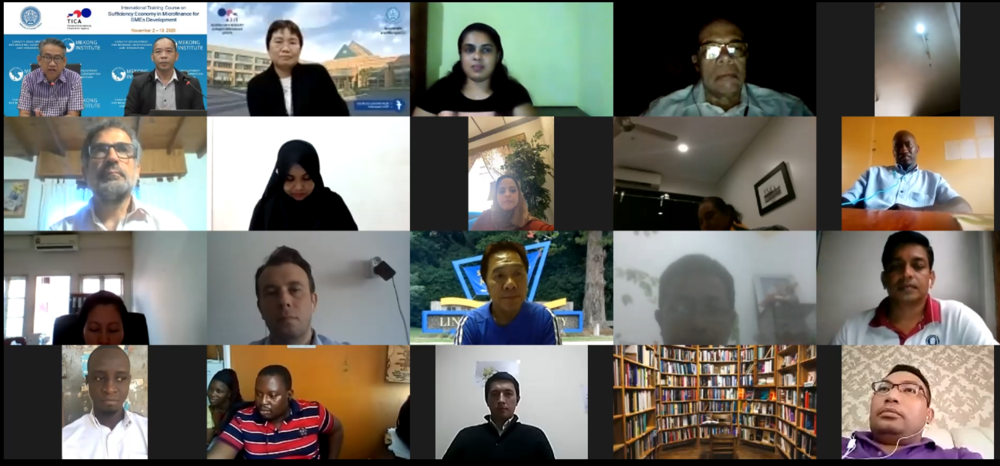Mekong Institute (MI) and Thailand International Cooperation Agency (TICA) have partnered to strengthen capacities of small- and medium-sized enterprises (SMEs) by introducing advanced financial concepts and approaches to 38 government, business, and academic officials at the recently completed international online training course on “Sufficiency Economy in Microfinance for SMEs Development.”
“SMEs are the growth engines of our economy. By pooling our expertise and perspectives in incorporating the sufficiency economy philosophy (SEP) into SME development, we will equip business owners with innovative strategies and provide them better access to financial support,” Mr. Suriyan Vichitlekarn, MI Executive Director, said during the opening session before underscoring that these investments will lead to increased SME productivity and revenue.
From November 2 to 13, 2020, participants from 23 countries with expertise in microcredit, microfinance, and banking were briefed on SEP, Microfinance for SMEs Development, Regulatory and Government Support for Microfinance Development, Establishment of Community-Based Microfinance, Financial Inclusion and Poverty, Sociological Framework of Rural Community-Based Microfinance, Sustainability and Depth of Outreach to further SME development support beyond the Greater Mekong Subregion.
Ms. Hathaichanok Siriwattanakul, TICA’s Director of Human Resource Development Division, stated TICA’s commitment in sharing best SEP practices to the world because the principles of moderation, reasonableness, and self-immunity are prerequisites to building a stable foundation for the sustainable recovery of national economies.
“By working together in identifying and making available financial coping strategies and capacity building initiatives, we can help SMEs thrive and participate in regional and international markets. Thus, stabilizing our supply and value chains in the current landscape,” Ms. Hathaichanok said.
Training participants from Argentina, Armenia, Bahrain, Cambodia, Honduras, Indonesia, Kenya, Kyrgyz Republic, Lao PDR, Malaysia, Maldives, Mali, Nigeria, Samoa, Sierra Leone, Sri Lanka, Thailand, Timor-Leste, Turkey, Ukraine, Uzbekistan, Vietnam, and Zambia reported that MI’s interactive course was highly beneficial, collectively stating that the comprehensive sessions—which were facilitated by experts—deepened their understanding of the value of SEP in microfinance.








